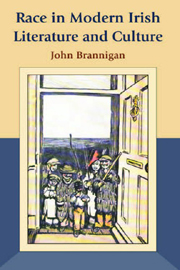Book contents
- Frontmatter
- Contents
- Illustrations
- Acknowledgements
- Introduction
- 1 1922, Ulysses, and the Irish Race Congress
- 2 Face Value: Racial Typology and Irish Modernism
- 3 ‘Aliens in Ireland’: Nation-building and the Ethics of Hospitality
- 4 ‘Ireland, and Black!’: The Cultural Politics of Racial Figuration
- Conclusion: Imagining the ‘New Hibernia’
- Bibliography
- Index
2 - Face Value: Racial Typology and Irish Modernism
Published online by Cambridge University Press: 12 September 2012
- Frontmatter
- Contents
- Illustrations
- Acknowledgements
- Introduction
- 1 1922, Ulysses, and the Irish Race Congress
- 2 Face Value: Racial Typology and Irish Modernism
- 3 ‘Aliens in Ireland’: Nation-building and the Ethics of Hospitality
- 4 ‘Ireland, and Black!’: The Cultural Politics of Racial Figuration
- Conclusion: Imagining the ‘New Hibernia’
- Bibliography
- Index
Summary
And here's John Synge himself, that rooted man
‘Forgetting human words,’ a grave deep face.
You that would judge me, do not judge alone
This book or that, come to this hallowed place
Where my friends' portraits hang and look thereon;
Ireland's history in their lineaments trace;
Think where man's glory most begins and ends,
And say my glory was I had such friends.
W. B. Yeats, ‘The Municipal Gallery Revisited’, 1937As Roy Foster comments in his biography, there is a hollow ring to the end of Yeats's late poem, ‘The Municipal Gallery Revisited’. It is a preposterous notion that Yeats might be judged not for his books, but ‘in the roll-call of his acquaintance’. The poem reflects upon the portraits and history paintings hung in the Dublin Municipal Gallery of Modern Art, a collection which celebrated the cultural and political history of the newly independent nation. Yeats alludes in passing to the portraits of Casement, Griffith, and Higgins, and paintings by Lavery, Keating, and Orpen, but it is finally ‘we three alone’ – Gregory, Synge, and himself – whose contributions to the making of the modern nation he comes to extol. The poem closes with what Foster describes as ‘an implicit epitaph for himself, and his own assumption into the heroic frieze of portraits’. To look upon the portraits of Gregory and Synge, Yeats suggests, is also to look upon his own portrait.
- Type
- Chapter
- Information
- Race in Modern Irish Literature and Culture , pp. 78 - 143Publisher: Edinburgh University PressPrint publication year: 2009

